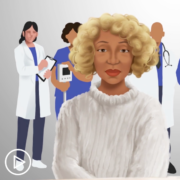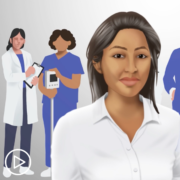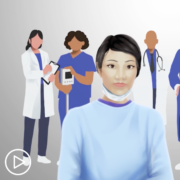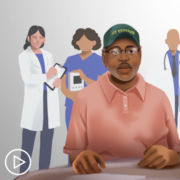Battling Small Cell Lung Cancer | One Man’s Journey
Battling Small Cell Lung Cancer | One Man’s Journey from Patient Empowerment Network on Vimeo.
Terrence’s diagnosis with extensive stage small cell lung cancer (SCLC) came as a shock. He learned the value of a positive attitude and how “just as in battle, I understood early on that a solid partnership with my healthcare team would be crucial to my outcome.” He shares his perspective, lessons learned, and how to stay [ACT]IVATED in your care.
Disclaimer: Thank you to small cell lung cancer expert Dr. Rafael Santana-Davila, PEN’s Empowerment Leads, patients, and care partners for reviewing and collaborating on this video. This video has been edited to protect the privacy of certain individuals, and the names and identifying details have been changed.
See More from [ACT]IVATED Small Cell Lung Cancer (SCLC)
Related Resources:

|

|

|
Transcript:
My name is Terrence, and I’m living with extensive-stage small cell lung cancer (SCLC). This diagnosis came as a shock, but I decided to persevere and fight. Cancer care can feel like a marathon, and certainly not a sprint – particularly for patients like me. As a small cell lung cancer survivor, I want to share my perspective and lessons learned from my cancer journey about staying ACTIVATED in your care.
My symptoms started with a cough that wouldn’t go away. As a military veteran, I assumed the cough was something I picked up years earlier. And even though I had been a smoker, my doctor didn’t order any scans as a pre-emptive screening measure, nor did I know what questions to ask. It wasn’t until I found a lump under my arm that further testing was done. It was at that time that I also put the other pieces of the puzzle together, which included symptoms of higher than normal blood pressure and knee pain.
I received chemotherapy and radiation, and also quickly learned that despite the challenges of treating my cancer, maintaining a positive attitude was the most critical part of my regimen. I was fortunate to have a medical team that listened to me and didn’t dismiss my concerns. Just as in battle, I understood early on that a solid partnership with my healthcare team would be crucial to my outcome.
Under the care of my healthcare team, I continue to receive scans of my lungs and brain every three months and feel grateful to be doing well. My care team and I also actively look for clinical trials that may be right for me. I urge other small cell lung cancer patients to ask your care team questions to learn about treatment options and what to expect during and after treatment – you matter.
For the past decade, there have been a lot of research advancements about non-small lung cancer (NSCLC) treatment, but our small cell lung community is feeling left out of conversations about investments to improve lung cancer diagnosis and treatment. The SCLC patient community also deserves improvements in care and treatment. Fortunately, things are changing. Progress in personalized medicine has allowed scientists to develop targeted therapies tailored to a patient’s body using their genes to prevent, diagnose, or treat an underlying disease. Clinical trials are one opportunity to be on the ground floor of these developments where you may be able to get tomorrow’s medicine today. I hope sharing my perspective will make a difference for others.
While the battle ahead has uncertainties, stay [ACT]IVATED with these tips:
- Don’t allow stigmas to keep you from getting the best care, now is the time to get the right care no matter how you got the cancer.
- Ask your care team questions to learn about small cell lung cancer treatment options and what to expect during and after treatment.
- Ask if a clinical trial may be a potential treatment option for you.
- Stay abreast of small cell lung cancer treatment options and research advancements.
Whether it’s combat in war or fighting cancer, no matter who you are, take it from me, attitude is everything. Stay [ACT]IVATED by being informed, empowered, and engaged in your small cell lung cancer care.
Share Your Feedback:
Create your own user feedback survey




